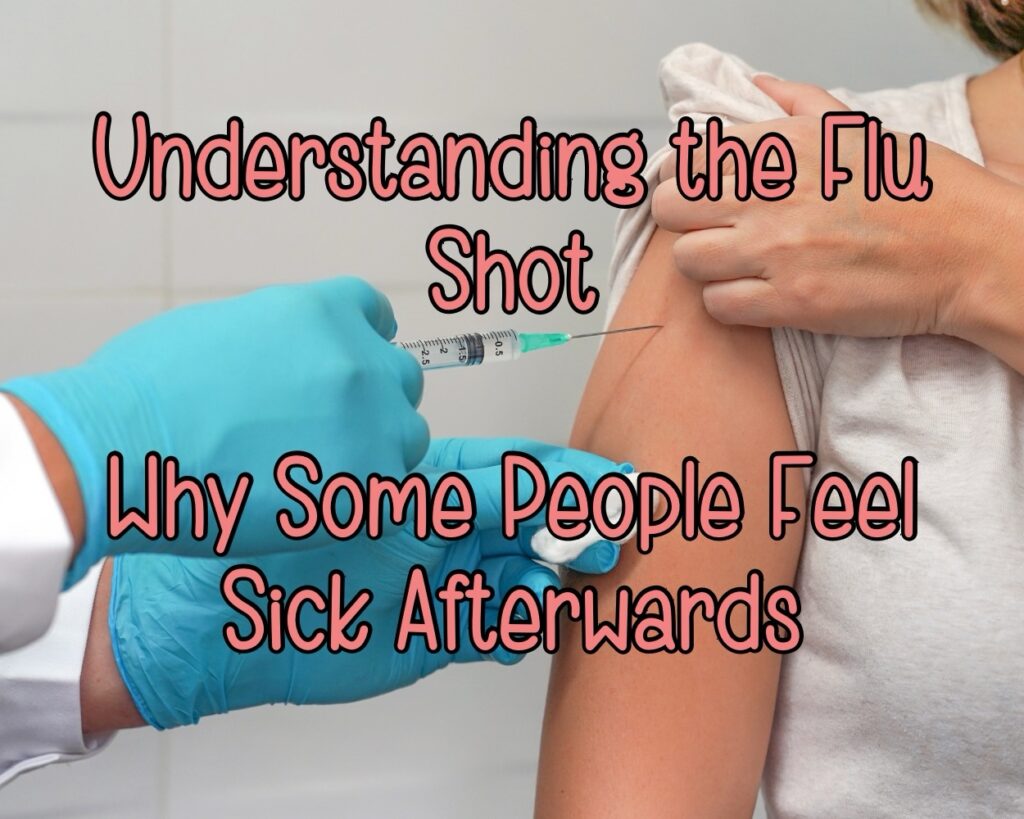The flu shot is an essential tool in preventing influenza, a potentially serious illness. However, some individuals report feeling sick after receiving the flu vaccine, despite the fact that the vaccine cannot cause the flu itself. This article explores why some people might feel unwell after a flu shot and the importance of this vaccine.

The Flu Vaccine: How It Works
The flu vaccine is designed to stimulate your immune system to produce antibodies against the influenza virus. These antibodies provide protection against the virus if you’re exposed to it later. The vaccine contains inactivated (killed) viruses or a single gene from a flu virus (as in the case of recombinant influenza vaccine) to trigger this immune response.
Common Reactions to the Flu Shot
- Mild Side Effects: It’s common to experience some mild side effects after getting a flu shot. These can include soreness, redness, or swelling at the injection site, low-grade fever, and aches. These symptoms are usually mild and short-lived.
- Immune Response: Feeling slightly unwell after a flu shot can be a sign that your body is building protection against the virus. This response is a normal part of the immune system’s activation and is not the same as having the flu.
- No Live Virus: The flu shot does not contain a live virus, so it cannot cause the flu. The symptoms some people experience are not from the flu but from the body’s immune response to the vaccine.
Why Some People Feel More Affected
- Individual Variability: People’s immune systems react differently to vaccines. Some might experience more pronounced symptoms as their body responds to the vaccine.
- Psychological Factors: In some cases, anxiety or anticipation about getting a vaccine can amplify perceptions of discomfort or mild symptoms.
- Coincidental Illness: Sometimes, people might coincidentally catch a cold or another virus around the time they get the flu shot, leading to a misconception that the shot caused their illness.
The Importance of the Flu Vaccine
Despite these potential side effects, the flu vaccine is a crucial public health tool. It significantly reduces the risk of flu illness, hospitalizations, and flu-related complications. Especially for high-risk groups like the elderly, young children, and people with certain chronic health conditions, getting vaccinated is an important preventive measure.
Feeling slightly unwell after a flu shot is typically a minor and temporary experience and should not deter you from getting vaccinated. The benefits of the flu vaccine, in terms of protecting yourself and those around you from influenza, far outweigh the discomfort of mild side effects. If you have concerns about the flu vaccine, it’s always best to consult with a healthcare professional for personalized advice.
While the flu shot is widely recommended by health professionals as a key measure in preventing influenza, it’s important to recognize that personal health decisions, including whether to get vaccinated, can vary based on individual circumstances and beliefs. Here, we explore some considerations for those who choose not to get the flu shot.
Personal Health and Medical Conditions
- Allergic Reactions: Some individuals may have severe allergies to components of the flu vaccine, such as egg protein or other ingredients, making vaccination unsafe for them.
- Medical Advisories: In rare cases, certain medical conditions may lead a healthcare provider to advise against flu vaccination. It’s important to follow personalized medical advice based on your health history.
Philosophical and Personal Beliefs
- Personal Autonomy: Every individual has the right to make decisions about their own health and body, including the choice to decline vaccination.
- Alternative Preventive Measures: Some people may prefer to rely on other preventive measures, such as frequent handwashing, wearing masks, and avoiding close contact with sick individuals, to reduce their risk of flu.
Weighing Risks and Benefits
- Risk Assessment: Individuals may assess their personal risk of flu differently, especially if they are in a low-risk category for flu complications.
- Effectiveness Concerns: Some people might be skeptical about the effectiveness of the flu vaccine, especially in years when the vaccine is less well-matched to circulating strains.
Community Considerations
- Herd Immunity: While herd immunity is important, especially to protect those who cannot be vaccinated, it’s also recognized that achieving this requires a high percentage of the population to be vaccinated, which may not always be feasible.
- Respecting Choices: In a diverse society, respecting different health choices and perspectives is important, even when they differ from mainstream medical advice.
The decision to get a flu shot is a personal one and should be made based on a thorough understanding of both the benefits and limitations of the vaccine, as well as individual health circumstances and beliefs. It’s always advisable to discuss any concerns or questions with a healthcare provider, who can offer guidance tailored to your specific health needs and conditions. Ultimately, informed choice is key in making decisions about flu vaccination.
As an Amazon Associate we earn from qualifying purchases through some links in our articles.




